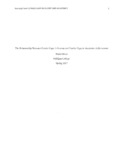| dc.description.abstract | The purpose of this research was to determine the relationship between the gender gap in
income and the gender gap in mathematic academic achievement, as measured by scores on the
math sections of the SAT and NAEP. Data on the gender gap in income from 1971 to 2015 were
collected from the The National Committee on Pay Equity, while data on the gender gap in
mathematic academic achievement were collected from SAT tests and the NAEP. As such, the
sample included all high school students who completed the NAEP or SAT. The data for each
category were converted into an expression of the gender gap for each year, as expressed by the
percentage of the average male score achieved by the average female. A Pearson productmoment
correlation coefficient test was conducted, comparing the income gender gap with the
gender gap in academic achievement on the mathematics sections of the NAEP and SAT. The
results indicated that there was a significant correlation between the gender gap in income and
the gender gap in mathematic academic achievement. These results suggest that, as the gender
gap in income narrows, female academic achievement in mathematics improves. | en_US |

